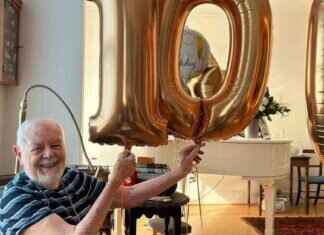Chilling, shopping, watching series – typical for many teenagers, but Adela Poteri can’t do anything with it. The 13-year-old prefers to study Chinese, quantum mechanics or the books of the world-famous astrophysicist Stephen Hawking. “He’s my favorite scientist,” says the student in a cafeteria at the University of Hanover. Adela’s eyes shine when she walks through the atrium of the main university building. The 13-year-old feels at home among the students – even visually, the young woman with the long, curly hair hardly differs from her much older fellow students.
Adela Poteri is highly talented and, according to expert definition, smarter than the majority of the population. According to Mensa, the nation’s largest network for gifted people, an intelligence quotient of 130 or more is considered gifted. Around 2.2 percent of people in Germany achieve this. According to Sabrina Henning, Vice-Chairman of the German Society for Gifted Children, there are around 300,000 gifted students nationwide. According to Henning, around 11,000 can be classified as highly gifted. You would have an IQ over 145.
Adela skipped four grades and would love to take her Abitur exams right away. However, a two-year qualification phase is necessary for this in Lower Saxony, which only begins after the summer holidays. Parallel to the upper school, the teenager has been enrolled as a junior student in mathematics since the 2022/2023 winter semester. She passed the “Analysis 1” exam, now “Stochastics” follows.
She can have the certificates credited later. Adela wants to study math and physics, write a doctoral thesis in both subjects and do pilot training. “Nine years ago I decided to become an astronaut,” she says. The four-year-old could already read back then, and when she was five she asked her mother for books by Hawking about the universe.
Children with so many interests and talents are sometimes viewed with suspicion or face prejudice. Won’t they be robbed of a carefree childhood? Are you under particular stress in view of the many learning projects?
On the contrary, says Henning. The constant under-challenging at school is stress for highly gifted children and can even make them ill: “When they are under-challenged, boredom is torture. Those affected struggle through their school days.” Elsbeth Stern, Professor of Psychology at ETH Zurich, adds: “It’s as if we would have to sit in a primary school again for a long time, where the alphabet is practiced.”
Adela is happy when her weekly plan, which she manages on her iPad, is well filled. Her parents fund her online tuition in several languages, including Chinese, Korean, as well as Montenegrin, her mother’s native language, and Bosnian, her father’s native language. In addition, the teenager plays the piano, saxophone and guitar, likes to sing and draw. “I go jogging with my dad several times a week,” she says.
About twice a year, Adela meets Klaus Urban and exchanges ideas with him. As a professor of special educational psychology at the University of Hanover, he researched giftedness back in the 1970s.
“Adela has a very high IQ, which many other people also have. What’s more, she has an enormous thirst for knowledge and enormous curiosity,” says the scientist. The 13-year-old is very disciplined when it comes to learning. “She is very structured and goal-oriented. At the same time, her friendliness, her warmth and her social side are quite remarkable,” enthuses Urban.
It is also remarkable and correct how Adela is working towards her goal of becoming an astronaut. Urban says many people who go on to achieve excellence in a particular field have pursued their goals since childhood. “For gifted children, learning is like playing.”
However, obstacles are sometimes put in the way of the high-flyers at school. “In general, everything in Germany is very bureaucratic,” criticizes intelligence researcher Stern. If a child wishes to skip a grade, applications would need to be made to the school authorities. “In my view, this should rather be decided in the individual schools by psychologists who are familiar with learning.”
Adela has had negative experiences at her previous school, which she does not want to talk about in the interview at the university. After the summer holidays she is going to another high school and is looking forward to the new school year with optimism and anticipation. She prefers to talk about astronaut Alexander Gerst, whom she wrote in 2019 and received a postcard back. “I would love to meet him once, but his schedule is certainly at least as busy as mine,” Adela suspects.



















